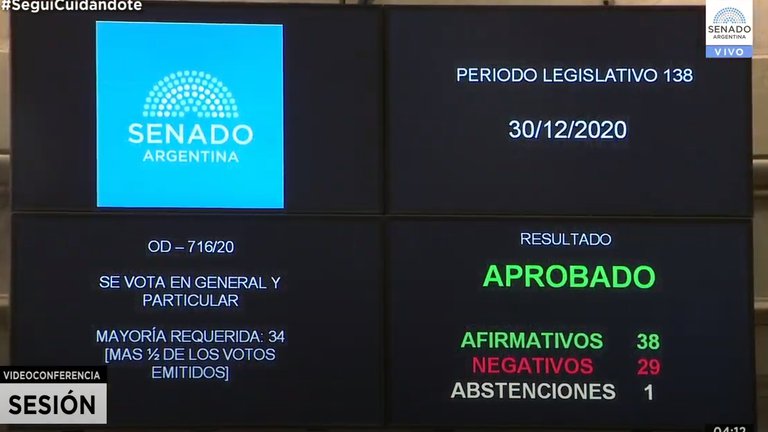RIO DE JANEIRO, BRAZIL – It is law. In Argentina, women who decide to terminate their pregnancy can do so legally, safely and free of charge in the healthcare system. On Wednesday, December 29th, at dawn, the Argentine Senate passed the legalization of abortion up to the 14th week of pregnancy, by a tally of 39 votes in favor, 29 against and one abstention.
It thus rescinded the law in force since 1921, which considered abortion a crime, except in case of rape or risk to the mother’s life. In the streets, the green tide, the color symbol of feminism in the country, exploded with joy.

With the new legislation, Argentina is once again at the forefront of social rights in Latin America. As of Wednesday, Argentina is the first large country in the region to allow women to decide about their bodies and whether or not they want to be mothers, as Uruguay, Cuba, Guyana and French Guiana have done.
In other countries, there are full or partial restrictions – this is the case in Brazil. A bill passed by the Chamber of Deputies two weeks ago, provides pregnant women with access to legal abortion until the 14th week after signing a written consent. It also establishes a maximum period of ten days between the request for abortion and its completion, in order to prevent manipulation that could delay the procedure.
In Argentina, pressure from religious and conservative groups to uphold the criminalization of abortion had been strong, but was not enough to replicate the result in 2018 when the Senate rejected the bill. Nevertheless, a hard legal offensive is expected. In Pope Francis’ native country, the Catholic Church still enjoys much prestige.
Francisco’s closeness to President Alberto Fernández is obvious, and the issue of abortion has always been an uncomfortable topic of dispute. The square outside Congress was evidence of this. On one side, where anti-abortion groups gathered, priests celebrated masses before makeshift altars and demonstrators carried crucifixes and rosaries, ultrasound images and a huge bloody cardboard fetus.
Unlike the Lower House, where the vote was easy, the result in the more conservative Senate was more uncertain. The numbers were very balanced and everything hinged on a handful of undecided legislators, who dropped from five to four: a senator announced that he would vote yes after a few adjustments to the bill’s text.
Hours later, two senators also announced their favorable vote and raised the yes to 38, against 32 naysayers. Furthermore, those opposed had lost two votes: that of Senator Carlos Menem, 90, in an induced coma due to a kidney complication; and that of ex-governor José Alperovich, on leave until December 31st due to accusations of sexual abuse.
The “yes” to the law was soon defined, even before midnight, when there were still four hours of speeches to go. “When I was born, women didn’t vote, we didn’t inherit, we couldn’t go to university. We couldn’t get divorced, we didn’t have housewives’ pensions. When I was born, women were nothing. I am moved by the struggle of all the women out there now. For all of them, may it be law,” Senator Silvia Sapag declared during the debate.
“We want it to be law so that no more women may die from illegal abortions. For María Campos. For Liliana. For Elizabeth. For Rupercia. For Paulina. For Rosario. For the over 3,000 women who have died from clandestine abortions since the return of democracy,” says 27-year-old Jimena López holding a poster reading “Legal abortion is social justice”. Among those opposed to the law, many criticized the lack of opportunity for debate amid the Covid-19 pandemic.
Others used religious arguments, like Senator María Belén Tapia: “The eyes of God are looking at every heart in this place and put before us the conditions for our nation as of today. Blessed if we value life, cursed if we choose to kill the innocent. I am not the one who says it, but rather the Bible on which I have sworn.”
The current law allowed the termination of pregnancy in case of rape or risk to the mother’s life or health, as in Brazil (which also authorizes abortion in case of anencephaly). In all other cases, it is a crime punishable with imprisonment. Still, criminalization is not a deterrent: according to unofficial estimates, up to half a million women undergo illegal abortions every year. In 2018, 38 women died from medical complications due to unsafe abortions. About 39,000 had to be hospitalized for the same cause.
“Forcing a woman to maintain her pregnancy is a human rights violation,” said senator Ana Claudia Almirón of the northern province of Corrientes. “With no sexual education programs, no provision of contraceptives, and no protocol for the legal termination of pregnancy, girls from Corrientes are forced to give birth at 10, 11, and 12 years of age,” said Almirón.
“We are holding 120 vigils at the federal level nationwide to urge the Senate to this time listen to this demand for human rights, public health and social justice,” demanded Mariángeles Guerrero, member of the National Campaign for the Right to Legal, Safe and Free Abortion. She states that since the last vote there has been a social decriminalization of abortion. “In 2018 we didn’t achieve the law, but we raised the population’s awareness to the issue: today there are women who have abortions in precarious and unhealthy conditions. Abortion is no longer a taboo topic that was discussed quietly, but rather one that needed to be discussed politically to ensure safe conditions for these abortions to be performed,” she adds.
Source: El Pais

